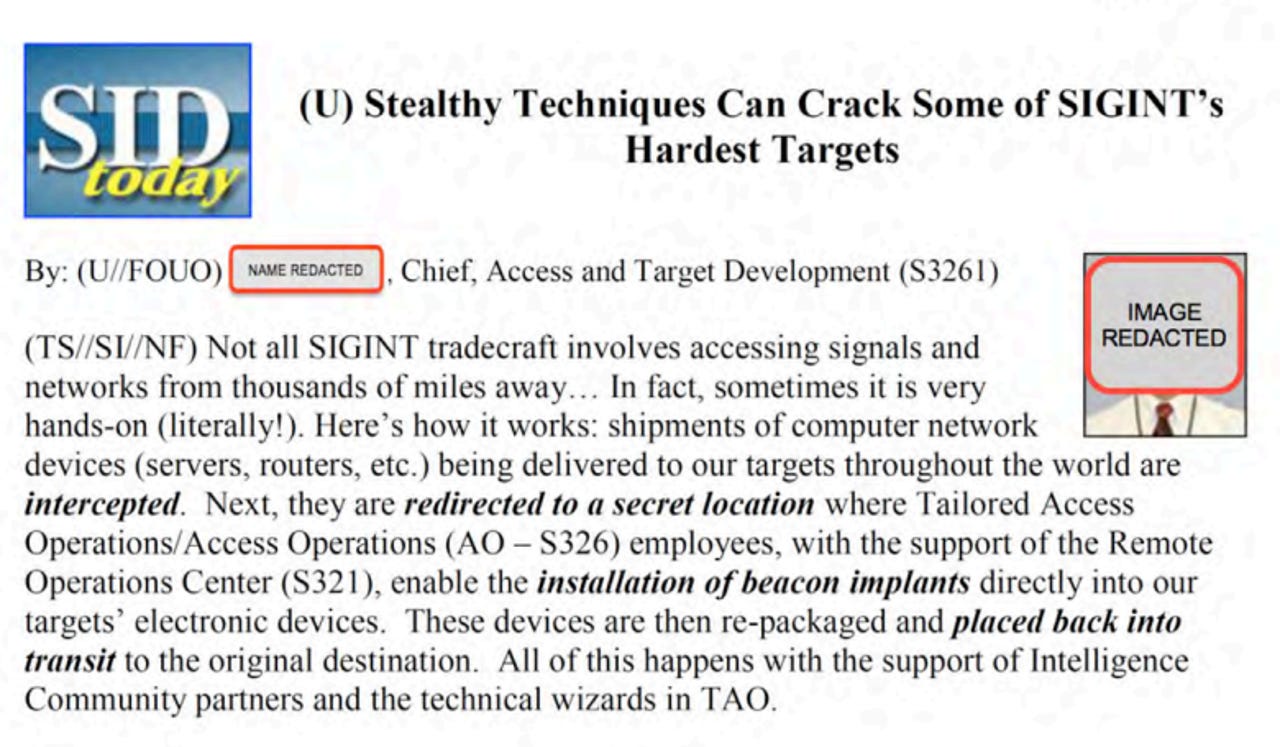Cisco's NSA problem is going to whack all of US tech's growth plans

Cisco's emerging markets business---the engine for the networking giant's future growth---continues to take a hit and that situation isn't likely to change now that it's common knowledge that the NSA has been intercepting routers---and other IT gear---in the supply chain so it can install call-home beacons.
These "upgrade" stations, which have generated a good bit of chatter, were revealed in Glenn Greenwald's book No Place to Hide. You can find the docs supporting Greenwald's book on his site even though links to the actual source information are hard to come by in the tech press.
According to the leaked docs, the NSA was really pleased with itself because it could intercept packages.

Cisco's general counsel Mark Chandler reiterated the U.S. government has overreached and shouldn't interfere with deliveries.
We comply with US laws, like those of many other countries, which limit exports to certain customers and destinations; we ought to be able to count on the government to then not interfere with the lawful delivery of our products in the form in which we have manufactured them. To do otherwise, and to violate legitimate privacy rights of individuals and institutions around the world, undermines confidence in our industry.
...undermines confidence in our industry
Special Feature
Chandler puts the confidence hit mildly. He should have said that the NSA supply chain intercepts kill business abroad, growth and jobs and will have a large economic impact well beyond Cisco. Simply put, the NSA has almost guaranteed that Huawei will own China as well as developing markets for years to come. Perhaps that reality doesn't matter now, but it will in another decade.
The other key point here is that the NSA was chest thumping because it intercepted "servers, routers, etc." Don't you think Dell, HP and IBM should worry about NSA installing beacons on their gear? How about Oracle, Western Digital or any other U.S. based player that manufactures anything here? Given the NSA practices, it would be a better idea to manufacture hardware outside the U.S. when shipping to some state that the U.S. government doesn't like at the time.
To recap, the NSA's supply chain intercepts will:
- Cost U.S. tech giants sales in key markets;
- Incentivize more manufacturing to go closer to countries outside the U.S.;
- Ultimately cost jobs;
- Kill trust in U.S. IT giants as well as the supply chain;
- And cost the U.S. its technology leadership.
How do we quantify these hits? Right now we don't, but it's hard to ignore that technology giants are sounding like broken records when it comes to emerging market growth. Following a solid earnings report and outlook, Cisco CEO John Chambers said:
There are three areas of our business which we have discussed for the last several quarters where we are managing through challenges, both macro
and Cisco specific. First, emerging markets from a macroeconomic perspective, continue to be challenging. Orders in our emerging markets declined 7% with the BRICs plus Mexico down 13%. As we've said for several quarters, we expect these challenges to continue.The challenges we saw in Brazil, down 27% and Russia down 28% are consistent with those we are hearing and seeing from our peers and customers, while China declined 8%, Mexico declined 3% and India declined 1%. Our strategy with emerging markets has not changed. Our relationship begins with the engagement with the leadership of the countries on key priorities for the country and technology development initiatives and drives all the way to local municipalities, their service providers and private businesses.
Can Cisco---or any other U.S. enterprise technology bellwether---really have engagement with leaders of other countries knowing the NSA is intercepting shipments? Short answer: Hell no.